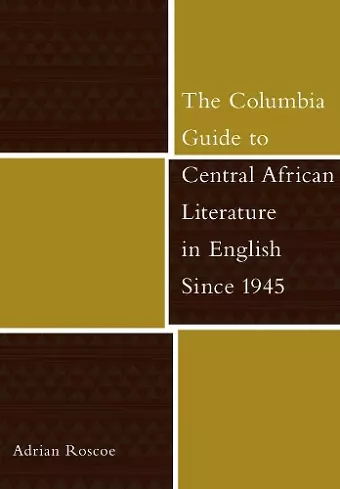The Columbia Guide to Central African Literature in English Since 1945
Format:Hardback
Publisher:Columbia University Press
Published:26th Oct '07
Currently unavailable, and unfortunately no date known when it will be back

This is a truly excellent book and will come to be seen as the key text in the field. Adrian Roscoe's writing is lucid, eloquent, and often witty. Individual author entries are exemplary in their combination of biography, brief but cogent analysis of primarytexts, which unfailingly highlights the essential qualities and achievements of each author, and recommendations for further reading. Any library with an interest in Africana should be expected to acquire it. -- Chris Dunton, professor of English and dean of humanities, National University of Lesotho
Columbia's guides to postwar African literature paint a portrait of the continent's literary traditions. This volume examines the growth of modern literature in the three postcolonial nations of Zimbabwe, Malawi, and Zambia. It tracks the multiple political and economic pressures that shaped Central African writing since the end of World War II.Columbia's guides to postwar African literature paint a unique portrait of the continent's rich and diverse literary traditions. This volume examines the rapid rise and growth of modern literature in the three postcolonial nations of Zimbabwe, Malawi, and Zambia. It tracks the multiple political and economic pressures that have shaped Central African writing since the end of World War II and reveals its authors' heroic efforts to keep their literary traditions alive in the face of extreme poverty and AIDS. Adrian Roscoe begins with a list of key political events. Since writers were composing within both colonial and postcolonial contexts, he pays particular attention to the nature of British colonialism, especially theories regarding its provenance and motivation. Roscoe discusses such historical figures as David Livingstone, Cecil Rhodes, and Sir Harry Johnston, as well as modern power players, including Robert Mugabe, Kenneth Kaunda, and Kamuzu Banda. He also addresses efforts to create a literary-historical record from an African perspective, an account that challenges white historiographies in which the colonized was neither agent nor informer. A comprehensive alphabetical guide profiles both established and emerging authors and further illustrates issues raised in the introduction. Roscoe then concludes with a detailed bibliography recommending additional reading and sources. At the close of World War II the people of Central Africa found themselves mired in imperial fatigue and broken promises of freedom. This fueled a desire for liberation and a major surge in literary production, and in this illuminating guide Roscoe details the campaigns for social justice and political integrity, for education and economic empowerment, and for gender equity, participatory democracy, rural development, and environmental care that characterized this exciting period of development.
Knowledgeably compiled by Adrian Roscoe... [It's] so useful with its wealth of background information: Literary, historical, cultural and political. -- Martin Rubin Washington Times An extremely valuable record of literary achievement... Highly recommended. CHOICE Any library that covers African studies or comparative literature will be well-advised to invest in this one. -- Bob Duckett Reference Reviews
- Winner of Choice Outstanding Academic Title 2008
ISBN: 9780231130424
Dimensions: unknown
Weight: unknown
220 pages